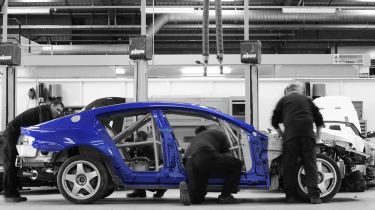Aston Rapide racecar: Behind the scenes
We visit Aston's special ops workshop for an exclusive photo shoot and the inside line on its Rapide racer
When you’ve got a line-up that includes the DBS and V12 Vantage, why on earth would you take your four-door saloon racing? When we heard that Aston Martin was preparing its Rapide to compete at the legendary Nurburgring 24 Hours, it was too good a story to miss. So with the big race looming in the second week of May, we headed down to Aston HQ to see how the project was progressing.
When we turned up the car was well and truly in mid-build, despite its first shakedown pencilled in for just a few days later. The racer had recently returned from receiving a fresh coat of its unique blue paint – but it still looked like a bunch of scaffolders had put it together, not a skilled team of engineers. Fortunately we had David King, head of Aston’s motorsport division to guide us around the roll cage and mass of tangled wires.
“The aim is not to win the race with the Rapide, but to publicly display the performance potential and reliability of the car, which is why we want to keep the racer as close to the road car as possible.
“The first Rapide customers will just be receiving their cars, and to see it out there mixing it on the racetrack is a nice surprise. We didn’t want to weld the back doors shut either, because having a shot of the car on the grid with all four doors open is an important marketing tool,” King Explained.
Used - available now

2016 BMW
5 Series
107,200 milesAutomaticDiesel2.0L
Cash £9,000
2023 Audi
e-tron
48,154 milesAutomaticElectric
Cash £18,000
2015 Volkswagen
Golf GTD
84,621 milesAutomaticDiesel2.0L
Cash £12,000
2016 Tesla
Model S
78,000 milesAutomaticElectric
Cash £18,999Watch the Rapide take on the Porsche Panamera in our exclusive video here.
It might not appear that way, but the racecar’s basic architecture is remarkably similar to the roadgoing Rapide. It has four functioning doors, a standard ABS system and the wiring remains unchanged. The engine is the same 470bhp 6.0-litre V12 you’ll find in showroom models, the only difference is this one has been stripped down and ‘optimised’ to iron out any imperfections. It even runs the production-spec six-speed semi-auto ZF gearbox.
Modifications to make the car track-ready include a larger 120-litre bag fuel tank – enough for ten or eleven laps of the epic 14.2-mile circuit – tweaked spring rates and uprated dampers, slick tyres, an air jack to prop the car up during pit stops, a roll cage and a less obtrusive exhaust. A stripped out interior and polycarbonate windows help to cut the weight down from 1,950kg to 1,560kg, but as King freely admits, that’s still pretty heavy for a racecar.
“The size and weight of the car are our biggest issues, but I think we’ll surprise a few people with our pace. The top cars lap in around 8mins 30seconds, last year our V12 Vantage was recording 9mins 30seconds laps – expect the Rapide to be only 10 or 15 seconds off that this year,” he said.
The Nurburgring 24 Hours is quite unlike any race in the world. King describes it as “an extension of our engineering and testing programme, but in front of the public. Nowhere else will you find top works drivers competing alongside the local hot shots in cars of all shapes and sizes.”
We asked King if Aston’s opinion-dividing citycar, the Cygnet, could ever make it onto the grid? “Why not, anything’s possible,” he replied.
See spy shots of the finished car in its first Nurburgring test session here.







